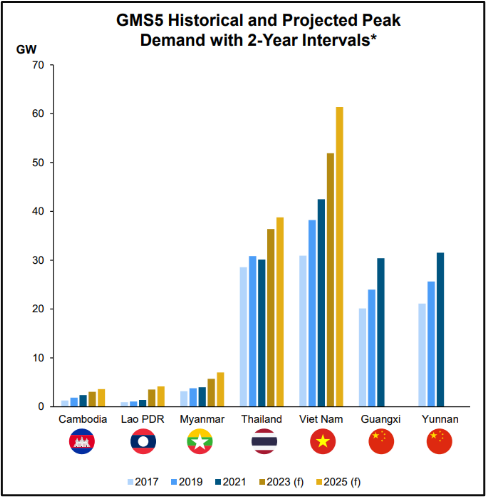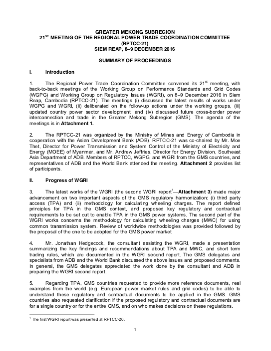More Oil Discovered in Viet Nam’s Mekong Basin
Korean firm SK Innovation has found another oil field in the Cuu Long (Mekong) Basin in southern Viet Nam.
Greater Mekong Subregion countries are in varying stages of economic development but share common goals concerning energy security and environmental protection. Progress have been made in promoting renewable energy, clean fuels, and energy efficiency, but new energy solutions remain crucial to the subregion’s advancement.
The GMS Economic Cooperation Program Strategic Framework 2030 (GMS-2030) emphasizes cross-border power trade, establishment of regional grid codes, development of regional markets, and expanding clean energy investments with a greater role for the private sector.
The Regional Power Trade Coordination Committee (RPTCC) managed regional power trade in the subregion from 2004–2022. In July 2022, at the 29th RPTCC meeting, the committee formally transitioned to the GMS Energy Transition Taskforce (ETTF). Among other things, the transition to ETTF ushers in closer energy cooperation with the Association of Southeast Asian Nations (ASEAN) and its initiatives, such as the ASEAN Power Grid.
Energy consumption in the GMS countries has grown intensively as their economies develop, driven mostly by residential and industrial sectors. Demand is forecasted to increase materially over the medium term.

GMS countries have used different approaches to increase access to reliable, affordable, and low-carbon energy.
See initiatives of the GMS Energy Transition Task Force to promote energy security in the subregion in a sustainable manner.
Related
Key Energy Resources
Focal Persons at the Asian Development Bank
Hyunjung Lee (lead)
Energy Sector Office
Sectors Group
Atsumasa Sakai
Energy Sector Office
Sectors Group
Other Concerned Staff & Consultants
Joao Aleluia
Energy Sector Office
Sectors Group
Architrandi Priambodo
Energy Sector Office
Sectors Group
Jeffrey Almera
Energy Sector Office
Sectors Group
Pinsuda Alexander
Regional Cooperation and Integration Unit
Southeast Asia Department
Rafaelita Jamon
Regional Cooperation and Integration Unit
Southeast Asia Department/GMS Secretariat
Send inquiries to GMS Secretariat.
Korean firm SK Innovation has found another oil field in the Cuu Long (Mekong) Basin in southern Viet Nam.
The Lao People’s Democratic Republic has signed an agreement with Electricité du Cambodge to sell 200 megawatts of electricity to Cambodia until 2021.
Quang Tri province is gearing up to become a center for energy production in the north central coastal region of Viet Nam. It recently approved the development of four 30-megawatt wind power plants worth more than $200 million.

This publication shows how strategic environmental assessments can help the Greater Mekong Subregion countries create sustainable national power development plans.
BANGKOK, THAILAND (9 November 2018) — The Asian Development Bank and Gulf SRC Company Limited have signed a $227.7 million loan agreement to help finance the construction and operation of a first-of-its-kind 2,500 megawatt combined cycle power plant in Chonburi Province of Thailand.
The Asian Development Bank has approved technical assistance for energy projects in Southeast Asia, including the Greater Mekong Subregion Cross-Border Power Trade and Distribution Project.

This is the summary of proceedings from the 24th Meeting of the Regional Power Trade Coordination Committee (RPTCC-24) on 18 to 20 June 2018 in Nay Pyi Taw, Myanmar.

ADB's financing will support B.Grimm Power’s implementation of the ASEAN Distributed Power Project, which will expand renewable and distributed power generation into new markets in Southeast Asia. Five countries in the Greater Mekong Subregion—Cambodia, Lao People's Democratic Republic, Myanmar, Thailand, and Viet Nam—are members of ASEAN. Photo: ADB.
BANGKOK, THAILAND (23 February 2018) — The Asian Development Bank signed a loan equivalent of up to $235 million with B.Grimm Power Public Company Limited, one of the largest power producers in Thailand, to develop and enhance renewable energy capacity in member countries of the Association of Southeast Asian Nations.
HONG KONG, CHINA (2 February 2018) — The Asian Development Bank today signed a $100 million loan facility agreement with China Everbright International Limited to help a series of municipal waste-to-energy plants in primary and secondary cities in the Mekong Delta.

This is the summary of proceedings of the 23rd Meeting of the Regional Power Trade Coordination Committee in Vientiane, Lao People’s Democratic Republic on 13-15 December 2017.